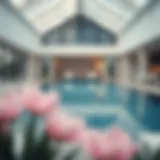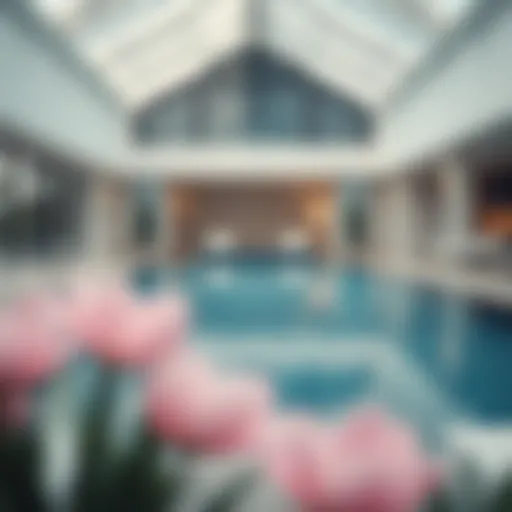Exploring Deira Souq: A Microcosm of Dubai's Trade
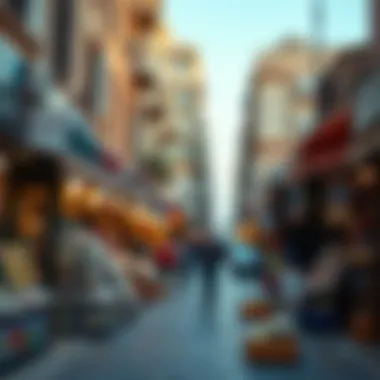

Intro
Nestled in the heart of Dubai, Deira Souq is more than just a marketplace; it embodies the spirit and resilience of the UAE’s past while serving the vibrant pulse of today's commerce. This neighborhood is steeped in history, acting as a pivotal centerpiece where the traditions of trade meet modernity. Many might equate souqs with chaotic bazaars full of noise and animated haggling, yet Deira's charm lies in its ability to weave cultural narratives into a tapestry of goods, sounds, and scents.
The souq displays an eclectic variety of wares, from aromatic spices and rich textiles to intricate handicrafts and, notably, gold. Each stall narrates a story of its origins and the cultural amalgamation that characterizes Dubai. As we peel back the layers of this intriguing place, we find its relevance extending beyond mere shopping; it stands as a crucial element of Dubai's economy and social fabric.
Here, we will delve into Deira Souq, uncovering its historical roots and contemporary significance. As we explore the marketplaces, we’ll also consider modern trading practices and their impact on the local community. This popular souq offers insight into an older way of commerce while embracing new trends that keep it relevant in these changing times.
Historical Overview of Deira Souq
Understanding the Historical Overview of Deira Souq provides a profound insight into the very essence of Dubai's trade dynamics and cultural identity. It serves as a backdrop against which one can comprehend not just the market itself, but the broader socioeconomic landscape of the region. By pondering the origins and development of this bustling hub, one begins to appreciate its role in shaping trade practices that have transcended generations.
Origins and Development
The origins of Deira Souq can be traced back to the days when Dubai was a modest fishing village. Established near the historical Dubai Creek, the souq emerged out of necessity, catering to the diverse needs of both local residents and itinerant traders. This area became a melting pot where pearls, spices, textiles, and various goods began to flow in and out, reflecting the vibrant life that characterized early Dubai.
Merchants from different corners of the Arabian Peninsula brought along not only their wares but also their unique cultures and traditions, enriching the marketplace. The souq system provided a platform for barter, trade, and social interactions, creating a close-knit community centered around commerce. Over the years, as trade routes flourished due to Dubai's strategic location, exponential growth in trade activities attracted both regional and international vendors.
Evolution through Time
As Dubai transformed from a small trading post into a global metropolis, Deira Souq adapted to the changing tides. The evolution through time mirrors the shifts in Dubai's economy—from traditional trading practices to the adoption of modern retail approaches.
In the 20th century, the souq faced unparalleled changes marked by the discovery of oil, which catapulted the city into the global spotlight. This transition brought significant investment, allowing Deira Souq to expand and modernize while still cherishing its historical roots. Though newer shopping centers emerged, the souq remains a cornerstone in Dubai's collective memory, illustrating a persistent nod to the past amidst modernization. The blend of old-world charm and contemporary commerce creates a unique shopping experience, attracting millions of visitors each year.
In essence, the historical trajectory of Deira Souq serves as a narrative of resilience.
"Deira Souq exemplifies the interplay between tradition and modernity, embodying Dubai's ethos of adaptability and growth."
As Dubai continues to evolve, the significance of Deira Souq in understanding its rich tapestry of culture and commerce becomes ever more crucial.
Architectural Features
The architecture of Deira Souq is not just a visual feast; it embodies the very essence of Dubai's cultural identity and economic spirit. This section explores essential design components and the deeper meaning behind them, reflecting the rich interplay between functionality and aesthetics that characterizes this historic market.
Design Elements
When standing in Deira Souq, one is immediately struck by the intricate designs that tell stories of a time long past. For example, the traditional Arabic arches frame various entry points, inviting visitors in with a promise of vibrant colors and enticing scents. These arches are not merely decorative but serve a practical purpose, allowing for breezes that help cool the interior spaces under the blistering Middle Eastern sun.
The mashrabiya - a type of wooden latticework – can be found in several buildings within the souq. This not only offers shade but also provides a means for ventilation and privacy. That touch of traditional construction is a visual reminder of how architects in the past combined necessity with beauty in their designs.
Furthermore, courtyards within the souq create communal spaces for buyers and sellers, fostering a sense of community. These veins of interaction are crucial not just for trade but also for social connections among locals and expatriates alike. The use of local materials and patterns also reflects the identity of the region. The terracotta and stone blend harmoniously with the vibrant textiles and spices displayed in the stalls, creating a picturesque scene that feels both alive and serene.
Cultural Significance of Architecture
Architecture in Deira Souq serves as a cultural lens, revealing the historical context and evolving societal values of Dubai. The layout of the souq itself is a testament to the caravan routes that once flowed through the area, hinting at how trade shaped the urban fabric of the city.
"The architectural elements are not just functional; they encapsulate the spirit and resilience of the community."
For Emiratis, these structures symbolize a connection to their past and provide a tangible link to their heritage. The bazaars that are well-preserved invoke nostalgia, holding memories of generations steeped in trade traditions. This architectural continuity fosters pride among locals while also drawing expatriates and tourists eager to experience authentic Dubai culture.
Moreover, as modern developments rise around the souq, the architectural features become even more significant. They act as bastions against the encroachment of rapid urbanization, emphasizing the need to protect cultural sites in a fast-paced world. The juxtaposition of new skyscrapers against the traditional market stall creates a dialogue between the past and the future, urging visitors to appreciate the depth and breadth of Dubai's trade history while understanding its journey towards modernity.
Through the lens of architecture, Deira Souq stands as both a relic and a living market, making it vital to not only observe but to engage with its architectural narrative, which ultimately contributes to a broader understanding of the region's identity.
Goods and Commodities in Deira Souq
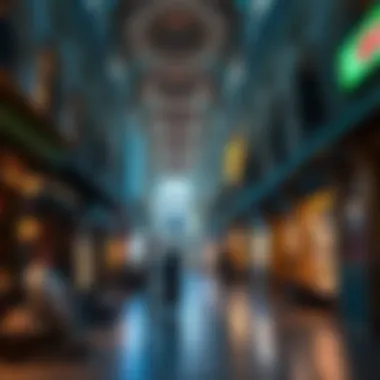

The Deira Souq is much more than just a marketplace; it stands as a representation of Dubai's cultural vibrance and trading legacy. This part of the article centers around the various goods and commodities that characterize the souq, ensuring a spotlight on the unique items that draw visitors and locals alike. Understanding what makes these goods special offers a window into not only the local economy but also into the diverse cultural exchanges that happen here.
Traditional Textiles
Traditional textiles are an essential part of the shopping experience in Deira Souq. From intricate embroidered fabrics to beautifully woven garments, the offerings reflect the rich craftsmanship that Dubai is known for.
Visitors can find materials like silk, cotton, and blends in a myriad of colors and patterns. The significance of these textiles goes deeper than aesthetics; they are woven into the history of the region. Local tailors often purchase these materials to create bespoke garments that cater to their customers' tastes. Textiles from regions like India and Turkey also grace many stalls, showcasing an interconnected history of trade routes.
A well-known feature is the Arabic "kaftan"—a long, flowing robe worn on various occasions. This piece is not just clothing; it's a cultural statement. Whether you’re purchasing a single meter of fabric or an entire outfit, the experience of selecting textiles in Deira is one of tactile engagement.
Spices and Herbs
Spice shops dominate parts of the souq, offering a sensory feast that captivates the senses. The air is often filled with rich, pungent aromas that tell tales of faraway lands. Each spice has its story to tell, underlining the historical reliance on spices not only for flavor but also for trade.
Common spices include saffron, turmeric, and cardamom, often sold in colorful sacks. These spices go beyond just culinary use; they play significant roles in medicinal practices as well. Local recipes that have been passed down through generations often rely on these spices for not just taste but also health benefits.
A unique feature of the spice market is the opportunity to negotiate. Bargaining is not just accepted, it’s expected! This practice adds an interactive layer to shopping, enriching the visitor's experience.
Gold and Jewelry Markets
The allure of gold draws visitors to Deira Souq like moths to a flame. Known as the Gold Souk, it houses an impressive array of jewelry that attracts both locals and tourists alike. From intricate bangles to stunning necklaces, the options are almost endless. What sets this souq apart is the craftsmanship; many pieces are designed using techniques that marry traditional artistry with modern flair.
Most importantly, gold prices are often competitive compared to Western markets. This gives buyers not only a chance to purchase fine jewelry but also to invest in precious metals. Vendors openly display their pieces, often illuminated to showcase their shine, making it an enticing way to experience the market.
Perfume Souks
The perfume market is another highlight of Deira Souq that never fails to impress. Here, visitors encounter a delightful range of scents—some familiar, others exotic. Traditional Arabic perfumes, often based on oud and musk, stand side by side with international fragrance brands.
What’s unique about the perfume souk is the option for customization. Vendors often invite you to mix and match scents to create a personalized fragrance. This interaction elevates the shopping experience and connects you to the age-old practice of perfume crafting.
Interestingly, many of the products rely on natural ingredients, showcasing a link to environmental consciousness among some local traders. This mixture of tradition with attitude towards modern sustainability resonates with visitors who are more discerning in their purchasing habits.
Deira Souq offers a blend of the old and the new, captivating both the senses and the mind.
In summary, the diverse range of goods and commodities in Deira Souq illustrates a microcosm of Dubai’s trade and culture. From colorful textiles and fragrant spices to gleaming gold and personalized perfumes, every item offers more than mere commercial value. They symbolize the rich history and the evolving nature of trade in this iconic market.
Visitor Experience and Cultural Interactions
Deira Souq is more than just a collection of stalls; it is a canvas where the vibrant strokes of commerce, culture, and history blend together. This segment is critical as it emphasizes how visitors interact with both the environment and the local community, making their experiences rich and immersive. Investing time in exploring this souq offers profound insights into the local way of life, traditions, and the intricate dance of trade practices.
The visitor experience involves a careful navigation of the market dynamics, enhancing their understanding of how cultural interactions take place amid the hustle and bustle.
Navigating the Market
Navigating Deira Souq can feel like a voyage through time. The narrow alleyways, adorned with traditional wooden arches, invite visitors to lose themselves amongst the myriad stalls. Every corner reveals a new discovery—be it textiles in vivid colors, the aroma of spices wafting through the air, or the glimmer of gold on every other stall. Visitors should take their time, allowing the sensory overload to wash over them. To truly enjoy the experience, it's wise to engage with local vendors, as many have tales to tell.
Important tips for navigating:
- Ask Questions: The vendors are often willing to share stories behind their goods, which adds a personal touch to the shopping experience.
- Bargain Smartly: Haggling is not just allowed; it's expected. A respectful negotiation can lead to delightful purchases.
- Explore Hidden Gems: Some items are tucked away in corners. Take detours and be open to exploring lesser-known areas of the market.
- Stay Hydrated: With all the walking and sensory engagement, make sure to have water handy.
Local Interactions
The heart of Deira Souq lies within the interactions between visitors and locals. As soon as one steps into the bustling atmosphere, the sight and sound of daily business create an ambience so captivating it feels alive. Engaging with shopkeepers can open doors to shared laughter, cultural nuances, and perhaps even new friendships.
For many expatriates and tourists, these interactions are enlightening. They can share personal stories about their wares, revealing how family traditions and legacies shape what they sell. In return, visitors are encouraged to share bits of their own culture or experiences, creating a delightful exchange of ideas and perspectives.
"Cultural exchanges at Deira Souq serve as a melting pot, enriching both locals and visitors in ways that transcend monetary transactions."
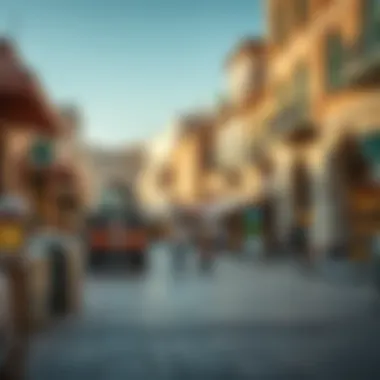

Benefits of Local Interactions:
- Cultural Learning: Visitors gain insight into Emirati customs and practices that are often overlooked in modern settings.
- Support Local Economy: By purchasing authentic goods, visitors contribute directly to the livelihoods of local artisans and merchants.
- Memory Creation: Unique interactions can lead to memorable experiences, something tourists will reminisce about long after they've left.
Through their exploration of Deira Souq, visitors partake not only in a shopping adventure but in a journey that connects them to the essence of Dubai's diverse culture and rich heritage.
Economic Impact of Deira Souq
The economic ramifications of Deira Souq extend beyond mere sales figures. This marketplace plays an intricate role in shaping not just the local economy, but also the broader commercial landscape of Dubai itself. The vitality of Deira Souq lies in its ability to fuse traditional trading practices with modern economic realities, making it a focal point for tourists and residents alike. It represents a unique intersection of culture and commerce, a microcosm where the lifeblood of trade surges through ancient pathways set against the backdrop of contemporary commerce.
Role in Dubai's Economy
Deira Souq serves as a cornerstone in Dubai's robust economy. With its bustling design and diverse offerings, the souq attracts visitors from all over the world. Tourists flock to experience the sights and sounds of the marketplace, while locals frequent it for everyday needs. This attraction translates into significant economic input, directly benefiting not just the vendors, but also various sectors supporting tourism, such as hospitality and transportation.
Moreover, the souq's historical significance is paired with its modern relevance. Vendors often engage in bargaining, a practice that underscores local customs and enhances buyer engagement, making shopping a unique experience. This hands-on trading method encourages merchants to foster relationships with customers, leading to repeat business and sustained economic circuits within the community.
The unique products available at Deira Souq, ranging from spices to textiles, further contribute to the local economy by attracting niche markets. This does not just enhance local commerce but serves as a critical channel for cultural exchange, allowing for diverse economic interactions that can lead to unexpected partnerships.
Employment Opportunities
The bustling environment of Deira Souq is a significant source of employment for many in Dubai, providing jobs across various levels— from sales personnel to management positions. The diversity in goods sold means there’s a need for specialists knowledgeable in different markets, thereby creating a variety of roles. Selling artisanal goods, for instance, requires a different skill set than dealing in electronics or spices.
By offering these opportunities, the souq supports a significant number of families, helping to sustain its community. Many of the workers are expatriates drawn to the vibrant trading scene, making Deira Souq not just a place for shopping but a hub of multicultural interactions.
Furthermore, as the souq adapts to modern trade practices, we see emerging roles in tech and logistics—whether it’s integrating e-commerce platforms or revamping supply chains to meet consumer demands. The shift towards a more digital approach is not just about maintaining traditions but also about expanding the marketplace’s reach for the future, providing even more avenues for employment and economic stability.
This ever-evolving landscape of Deira Souq illustrates that while the past is cherished, the future is being actively shaped through innovation and adaptation, ensuring lasting impact on Dubai's economy.
Deira Souq and Modern Trade Practices
Deira Souq serves not just as a historical landmark but also as a vivid illustration of how traditional marketplaces can adapt to contemporary trade practices. The interplay between the old and new highlights the significance of this souq in Dubai’s socio-economic milieu. As we unfold this topic, it is essential to recognize the changing dynamics of trade within Deira Souq, shaped largely by technology and shifting consumer behaviors.
Integration of Technology
In recent years, the infusion of technology into Deira Souq has transformed the shopping experience. Vendors have begun to leverage digital platforms, creating an online presence to expand their reach. With the rise of online shopping, many shopkeepers are utilizing social media and e-commerce platforms to showcase their goods. For instance, artisans selling traditional textiles now post high-quality images on Instagram to attract a global clientele.
"The integration of technology into Deira Souq is not just about convenience; it's about survival in a rapidly evolving market."
Mobile payment options have also become prevalent. Visitors can now avoid the hassle of cash transactions by using services like Talabat and Noon, streamlining purchases and enhancing the overall consumer experience. This shift not only caters to a tech-savvy populace but also encourages a younger generation to engage with the rich cultural heritage of the souq.
Shifts in Consumer Behavior
As the market matures, so do the preferences of its consumers. The modern shopper is not merely interested in purchasing products; they seek experiences. In Deira Souq, this translates into a demand for immersive interactions that connect them to the culture of Dubai. Local vendors have begun to adapt by offering personalized services, such as bespoke jewelry design or informative talks on spice origins.
Notably, the travel restrictions due to the pandemic has also altered shopping habits. Many consumers are now opting for more sustainable and ethical choices, influencing what is provided within the souq. Shoppers express a growing interest in locally sourced products, with many buying handmade items that support local artisans.
In summary, the manifestations of modern trade practices within Deira Souq illustrate an evolving landscape where technology meets tradition. The souq is not just a testament of folklore; it is actively navigating through the complexities of modern economic realities, ensuring its relevance in an ever-changing world.
Sustainable Practices in Deira Souq
The concept of sustainability has become a focal point in modern trade, and Deira Souq is no exception. This market, steeped in tradition and culture, is beginning to adopt practices that not only benefit the economy but also the environment and local community. As the world shifts towards more conscientious consumption, understanding these sustainable practices is crucial for investors, homeowners, and expatriates looking to engage meaningfully with Dubai’s heritage.
A significant aspect to consider here is how these practices can enhance the trading experience while also protecting the cultural integrity of the souq. Integrating sustainable practices helps preserve the rich history while ensuring the souq adapts to future challenges and opportunities.
Environmental Considerations
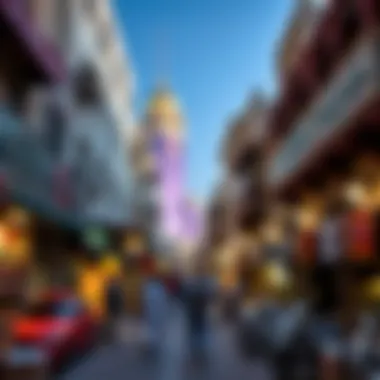

The environmental impact of marketplaces like Deira Souq can be profound. With the surge of visitors and the increase in trade, waste generation has risen sharply. Traditional markets are not immune to such troubles, but they can lead the way in implementing ambitious green initiatives. Some practices being adapted include waste segregation—where traders are encouraged to sort organic waste from recyclables—and water conservation measures, particularly given Dubai's arid climate.
To elaborate, efforts to reduce plastic usage are crucial. Many stall owners now offer alternatives such as biodegradable packaging or encourage shoppers to bring their own bags. This change is not just a trend; it's a necessity that reflects a growing awareness of global environmental challenges.
Moreover, the promotion of local products helps reduce carbon footprints associated with transportation and supports local artisans. By sourcing goods locally, the souq not only champions its vendors but also minimizes the environmental impact that far-flung imports entail.
"Sustainability in Deira Souq is about marrying the past with the future, ensuring that the stories told through its stalls remain a living tradition while meeting the demands of tomorrow’s economy."
Community Engagement and Initiatives
Community plays a pivotal role in the dynamics of Deira Souq. Initiatives aimed at enhancing community involvement in sustainability efforts foster a sense of belonging and ownership among local vendors and residents. Workshops and educational sessions are growing in popularity, focusing on topics like sustainable farming, recycling, and energy conservation. Residents are encouraged to participate actively, fostering a deeper understanding of their local ecosystem and the importance of its preservation.
Furthermore, the souq is exploring partnerships with local nonprofits and governmental bodies to support sustainability. For instance, campaigns around responsible shopping can raise awareness and inspire positive changes in consumer behavior. This cooperative approach creates a web of support that not only benefits the environment but also strengthens social ties within the community.
The commitment to sustainable practices in Deira Souq reflects a progressive stance that could serve as a model for other traditional markets. Balancing commerce with environmental stewardship will enhance the market’s appeal not just to visitors, but also to discerning investors and businesses looking to align themselves with responsible trade.
In the end, sustainability is not merely an add-on but rather an essential aspect that intertwines with the soul of Deira Souq, making each visit not only a shopping expedition but also a step towards a more sustainable future.
Challenges Facing Deira Souq
Understanding the challenges facing Deira Souq is crucial to grasping its current dynamics and future potential. As a cornerstone of Dubai's trade architecture, the souq's resilience is constantly tested by various factors that could shape its operational landscape. Addressing these challenges offers insights into the ongoing evolution of this iconic marketplace, providing nuances on how traditional systems navigate modern pressures.
Competition from Modern Retail
The advent of large shopping malls and online retail platforms has undeniably added a layer of complexity to Deira Souq's existence. Consumers are increasingly drawn to modern conveniences—ample parking, climate control, and a diversified shopping experience. These malls, equipped with numerous brands under one roof, can easily overshadow the charm of the souq.
- Varied Options: Malls often provide a wider selection of international products, which some may find appealing. The availability of brands like Zara, H&M, and Carrefour attracts a demographic that favors brand familiarity and global quality assurance.
- Convenient Timing: Modern retail chains offer consistent operating hours, unlike many souqs that may close in the afternoon, limiting customer access. This flexibility is particularly pivotal for expatriates and busy professionals in Dubai.
- Discount Strategies: Sales promotions and loyalty programs from major retailers can lure customers away from traditional markets, making the competitive landscape even tougher.
Despite these challenges, Deira Souq maintains unique selling points that modern establishments cannot replicate, such as its rich history, cultural experiences, and local artisan goods. It needs to adapt, turning its historical advantages into a competitive edge.
Economic Fluctuations
The economic climate can significantly influence the operations within Deira Souq. Fluctuating conditions may arise from various factors: global market trends, currency exchange rates, and local economic policies. All these can drastically affect trader margins and consumer spending behavior.
- Impact of Tourism: The reliance on tourism, driven by fluctuating geopolitical climates and seasonal trends, can result in income instability for local businesses. As travel variables shift, the amount of disposable income that visitors bring into the souq can decrease, leading to fewer sales.
- Supply Chain Issues: Economic downturns can also hamper the buying power of traders, leading to potential shortages of goods. An interruption, say from natural disasters or political unrest in supplier countries, can create a ripple effect, making essential supplies hard to come by, affecting both pricing and availability.
- Costs of Operations: Rising costs of utilities and rental fees can also put a strain on small vendors, making it more difficult for them to sustain their businesses. For many, the margins are already slim, so any increase in overhead can be detrimental.
The local community of traders and artisans is being pushed to confront these economic headwinds head-on, and their resilience will play a significant role in determining whether the souq can withstand these financial pressures.
The path ahead for Deira Souq will hinge on how effectively it can leverage its unique strengths while adapting to the changing tides of commerce and economic environments.
Future Outlook for Deira Souq
The future of Deira Souq is a crucial aspect to consider for investors, homeowners, expatriates, agents, and developers interested in Dubai's economic landscape. This bustling marketplace, rich in cultural heritage, bears a unique potential to blend tradition with modernity. As the city evolves, maintaining the soul of Deira while integrating new strategies can create a compelling narrative for all stakeholders.
Strategic Development Plans
Strategic development plans for Deira Souq are multi-faceted, aimed at reinforcing its role as a pivotal commercial hub while ensuring that its cultural essence remains intact. Here are several key elements:
- Infrastructure Improvements: Upgrading facilities such as lighting, signage, and accessibility can significantly enhance the overall visitor experience. Modern amenities should be introduced while paying homage to traditional architecture.
- Marketing Initiatives: Developing targeted marketing strategies is essential in attracting both international tourists and local residents. Telling the story of Deira's rich heritage through social media campaigns can create a vibrant buzz around the souq.
- Sustainability Measures: Implementing eco-friendly practices can appeal to environmentally conscious consumers. Installations for waste management, water conservation, and renewable energy sources could be beneficial.
- Cultural Events: Hosting regular cultural festivals, workshops, and exhibitions will draw larger crowds and immerse them in the local traditions.
An emphasis on these plans will place Deira at the forefront of Dubai’s economic recovery and growth.
Vision for Cultural Preservation
As modern retail continues to encroach upon the traditional souq experience, the vision for cultural preservation in Deira Souq must be paramount. Herein lies the blueprint for successful integration and sustainability of its rich heritage features:
"To preserve the unique identity of Deira Souq while fostering economic growth, harmony between past and future is key."
- Community Involvement: Engaging local artisans and merchants in decision-making processes can create a sense of ownership and responsibility towards preserving their craft and culture.
- Educational Programs: Introducing programs focused on traditional crafts and heritage can attract youth interest, ensuring skills and knowledge are passed down.
- Historic Documentation: Regular documentation and celebration of Deira’s history and stories can keep its cultural narrative alive. Archiving oral histories or creating interactive exhibits will enhance visitors' appreciation.
- Collaborations: Partnering with cultural organizations and institutions can facilitate events that showcase the legacy of Deira Souq, fostering a sense of community and purpose.
By strategically encompassing these aspects, Deira Souq can thrive amidst change while remaining a beloved part of Dubai's cultural identity.
Further engagement in platforms discussing urban trade dynamics can be found at Britannica, along with insights from local stakeholders on Reddit.


